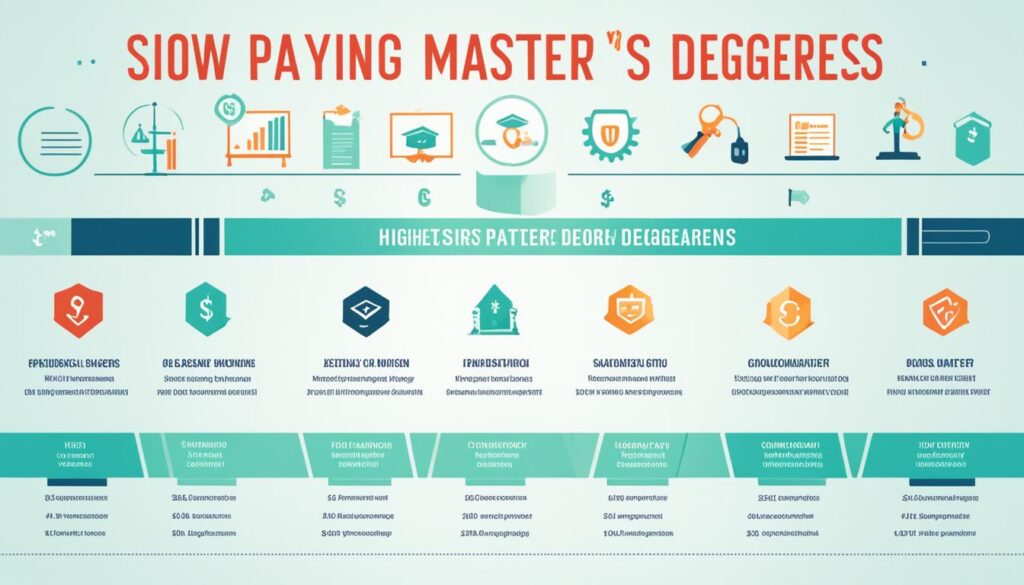Did you know that graduates of advanced degree programs earn about 25 percent more than those with just a bachelor’s degree? That’s according to the Economic Policy Institute, highlighting the significant financial benefits of pursuing a master’s degree. If you’re considering furthering your education and want to know which master’s degrees lead to the highest salaries, read on.
Key Takeaways:
- The highest-paying master’s degrees are in fields such as business administration, nursing, engineering management, petroleum engineering, and finance.
- These degrees can lead to lucrative careers in IT management, marketing, sales management, business operations, nurse anesthesia, nurse practitioner, architectural and engineering management, petroleum engineering, and financial management.
- Starting salaries for these positions range from $98,100 to $203,090.
Highest-Paying Master’s Degrees
If you’re looking to pursue a master’s degree that can lead to lucrative career opportunities and higher earning potential, consider the following highest-paying master’s degrees:
1. Master of Business Administration (MBA)
Careers in this field include IT manager, marketing manager, sales manager, and business operations manager. With an MBA, you can excel in various industries and command impressive salaries.
2. Master of Science in Nursing
For those interested in healthcare, pursuing a Master of Science in Nursing can open doors to careers as a nurse anesthetist or nurse practitioner. These roles offer both fulfillment and attractive financial rewards.
3. Master of Engineering Management
If you have a passion for engineering and aspire to managerial positions, a Master of Engineering Management can equip you with the necessary skills to become an architectural and engineering manager, overseeing complex projects and teams.
4. Master of Science in Petroleum Engineering
Specializing in the field of petroleum engineering can lead to a lucrative career as a petroleum engineer. With a Master of Science in Petroleum Engineering, you can contribute to the development of energy resources and earn a sizable income.
5. Master of Science in Finance
If you have an interest in finance and enjoy analyzing data, pursuing a Master of Science in Finance can pave the way to becoming a financial manager or actuary. These roles offer excellent compensation and opportunities for career growth.

These master’s degree programs provide specialized knowledge and skills that employers highly value. By investing in one of these top-paying master’s degrees, you can position yourself for success in high-demand industries and secure a financially rewarding future.
Conclusion
Pursuing a master’s degree can lead to higher earnings and career advancement opportunities. Graduates with the highest-paying master’s degrees in fields such as business, healthcare, engineering, and finance have the potential to earn six-figure salaries in positions like IT managers, nurse anesthetists, architectural and engineering managers, petroleum engineers, and financial managers.
When considering a master’s degree, it is important to research the specific industry and career opportunities to ensure a good return on investment. By choosing a field that aligns with your interests and offers strong earning potential, you can position yourself for long-term success.
Investing in your education by pursuing a master’s degree can open doors to a wide range of lucrative career options. As you weigh your options, take into account the earning potential, job prospects, and personal fulfillment that each degree offers. With careful consideration, you can make an informed decision that sets you on a path to financial success and professional fulfillment.
Source Links
- https://graduate.northeastern.edu/resources/highest-paying-masters-degrees/
- https://www.degreechoices.com/blog/highest-paying-masters-degrees/
- https://www.bestcolleges.com/online-schools/masters/highest-paying/


